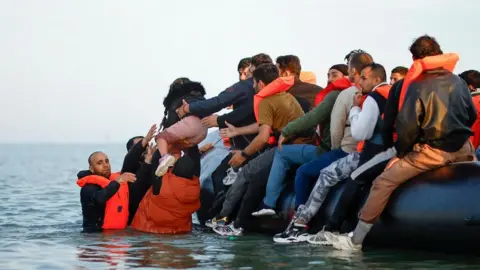**Government Pledges Extra £100 Million to Combat People Smuggling**
In a decisive move against the rising tide of illegal people smuggling across the English Channel, the UK Government has recently committed an additional £100 million to enhance its efforts in tackling this pressing issue. The announcement comes from the Home Office, highlighting an urgent response to a record number of individuals making perilous crossings from France to the UK in small boats, with over 25,000 attempts logged by late July 2025.
**Investing in Enforcement and Technology**
The financial injection is intended to support the deployment of up to 300 additional officers from the National Crime Agency (NCA). These resources will also be allocated toward acquiring new technology and equipment aimed at fortifying the UK’s border security. The Home Secretary, Yvette Cooper, emphasized that this funding will enable the authorities to better track and dismantle the smuggling gangs responsible for these dangerous journeys.
However, not all political factions are in agreement about these measures. Members of the Conservative Party have labeled the announcement as a “desperate grab for headlines,” suggesting that it may lack the substance needed to effect real change in the approach to people smuggling.
**Strategic Partnerships and Return Agreements**
The UK government’s strategy also includes a “one in, one out” pilot scheme negotiated with French authorities, which aims to dissuade migrants from undertaking the hazardous crossing. Under this arrangement, certain arrivals will be returned to France, and in turn, the UK will accept an equivalent number of asylum seekers, contingent upon security checks.
This initiative intends not only to reduce unlawful crossings but also to reinforce investigations into the smuggling networks that operate transnationally, particularly in Europe, the Middle East, and Africa. As highlighted by Rob Jones, the NCA’s director general of operations, there are currently 91 ongoing investigations targeting various smuggling networks.
**Criticism and Political Backlash**
Despite this funding boost, criticism continues to emerge from various political quarters. Chris Philp, the shadow home secretary, asserted that the Labour party lacks a coherent plan to address the crisis effectively. His comments resonate with public sentiment, expressing a desire for concrete actions rather than mere rhetoric.
In a pointed piece published in the Daily Express, Reform UK leader Nigel Farage criticized the government’s strategy, suggesting that merely appropriating additional taxpayers’ money would not significantly alter the dynamics of illegal immigration. He contended that without more substantial and effective measures, challenges related to people smuggling would persist.
Both Labour and Conservative administrations have grappled with the issue of illegal crossings, with earlier proposals, including plans to relocate asylum seekers to Rwanda, facing delays and legal challenges. Such complications have underscored the complex nature of immigration issues in the UK.
**New Offenses and Enhanced Regulations**
In addition to financial commitments, the government is considering new legislative measures that would introduce penalties for individuals advertising illegal crossings online. This proposed offense would give law enforcement greater authority to combat criminal gangs that exploit individuals seeking immigration assistance. Currently, the act of assisting illegal immigration is already a crime; however, the new legislation aims to close loopholes that have allowed these activities to proliferate, particularly through digital platforms.
This new offense would apply to activities such as promoting fake passports or offering illegal job opportunities. Breaking this law could result in significant penalties, including substantial fines and imprisonment for offenders.
**Conclusion**
In summary, the UK Government’s announcement of £100 million in funding to combat people smuggling is a response to a growing crisis characterized by record numbers crossing the English Channel. While this initiative aims to bolster enforcement capacity and strengthen investigative capabilities, the surrounding debate underscores a broader political divide on how to tackle immigration effectively and humanely. The evolving landscape of regulations, along with international agreements, highlights the complexities that both the government and various stakeholders face as they grapple with this multifaceted issue.












